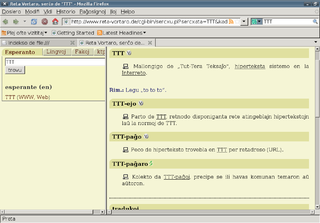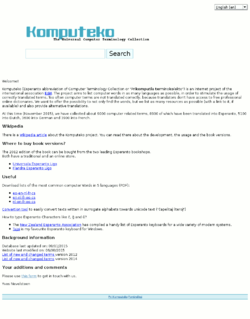Esperanto vocabulary and grammatical forms derive primarily from the Romance languages, with substantial contributions from Germanic languages. The language occupies a middle ground between "naturalistic" constructed languages such as Interlingua, which borrow words en masse from their source languages with little internal derivation, and a priori conlangs such as Solresol, in which the words have no historical connection to other languages. In Esperanto, root words are borrowed and retain much of the form of their source language, whether the phonetic form (eks- from international ex-,vualo from French voile) or orthographic form (teamo and boato from English team and boat,soifo from French soif). However, each root can then form dozens of derivations which may bear little resemblance to equivalent words in the source languages, such as registaro (government), which is derived from the Latinate root reg but has a morphology closer to German or Russian.

Kazimierz Bein, often referred to by his pseudonym Kabe, was a Polish ophthalmologist, the founder and sometime director of the Warsaw Ophthalmic Institute.
The original word base of Esperanto contained around 900 root words and was defined in Unua Libro, published by L. L. Zamenhof in 1887. In 1894, Zamenhof published the first Esperanto dictionary, Universala vortaro, which was written in five languages and supplied a larger set of root words, adding 1740 new words.

Fundamento de Esperanto is a 1905 book by L. L. Zamenhof, in which the author explains the basic grammar rules and vocabulary that constitute the basis of the constructed language Esperanto. On August 9, 1905, it was made the only obligatory authority over the language by the Declaration of Boulogne at the first World Esperanto Congress. Much of the content of the book is a reproduction of content from Zamenhof's earlier works, particularly Unua Libro.

Plena Ilustrita Vortaro de Esperanto is a monolingual dictionary of the language Esperanto. It was first compiled in 1970 by a large team of Esperanto linguists and specialists under the guidance of Gaston Waringhien and is published by the Sennacieca Asocio Tutmonda (SAT). It may be consulted online for free.

Allama Muztar Abbasi was a Pakistani Muslim scholar who belonged to the Dhund Abbasi tribe of Murree Hills in the Rawalpindi District. He was a supporter of the Esperanto language in Pakistan. He was patron in chief of the Pakistan Esperanto Association (PakEsA). He translated the Quran into Esperanto and wrote a biography of Muhammad and several other books in Esperanto and Urdu.

The on-line and free dictionary FREELANG is a bilingual dictionary for Microsoft Windows. Founded in 1997 by Beaumont.
Like natural languages, the constructed language Esperanto contains profane words and indecent vocabulary. Some of this was formulated out of the established core vocabulary, or by giving specific profane or indecent senses to regularly formed Esperanto words. Other instances represent informal neologisms that remain technically outside the defined vocabulary of the language, but have become established by usage.

Michel Duc Goninaz was a French Esperantist known worldwide for his 2002 revision of La Plena Ilustrita Vortaro de Esperanto.

The Vortaro de Esperanto, published by Kazimierz Bein in 1911, was the first monolingual dictionary ever published in Esperanto.
Plena Vortaro de Esperanto is a monolingual dictionary of the Esperanto language first published by the Sennacieca Asocio Tutmonda (SAT) in 1930, largely considered the first truly comprehensive dictionary written entirely in Esperanto.
Esperantology, or Esperanto studies, is a special Esperanto linguistics whose subjects are word construction, word assembly, word introduction and transcription of umbrella terms and proper names. Esperantology principles of word construction are exemplary of the principles of necessity and sufficiency which postulate a balance between conciseness and clarity of the word. Regarding word roots, esperantology sets these principles:

Eugen Wüster was an industrialist and terminologist.
Hans Michael Maitzen is an Austrian astronomer.

Reta Vortaro is a general-purpose multilingual Esperanto dictionary for the Internet. Each of the dictionary's headwords is defined in Esperanto, along with additional information, such as example sentences, to help distinguish the subtle shades of meaning that each particular word form may have.

Komputeko is an online project of the non-profit youth organization E@I (“Education@Internet”) with the goal of bringing together parallel computer terminology from various dictionaries in order to facilitate access to and comparison between different translations and thus promote exact use of language and counteract the usage of linguistic borrowings from American English. Komputeko is short for the Esperanto noun phrase "Prikomputila terminokolekto", meaning "collection of computer terms". The dictionary is written in five languages, and there are plans to expand it into other languages. A preliminary version with a few other languages already exists.
Claus Killing-Günkel, in Esperanto also known as Nikolao Günkel, is a German teacher and interlinguist.

The following outline is provided as an overview of and topical guide to Esperanto:
This page is based on this
Wikipedia article Text is available under the
CC BY-SA 4.0 license; additional terms may apply.
Images, videos and audio are available under their respective licenses.












